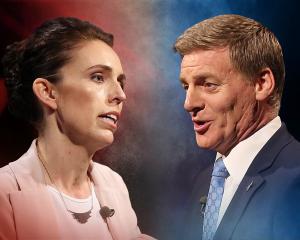The New Zealand Labour Party needs only to look across ''the ditch'' to find evidence of the devastating fallout of political infighting.
Years of in-house political bad-blood, bickering and undermining in Canberra resulted in extraordinary scenes last Wednesday night, when Kevin Rudd finally toppled Julia Gillard as Labor Party leader - and therefore Australian Prime Minister - by his caucus colleagues.
One political commentator subsequently called it the most poisonous and inglorious chapter in the party's history. Mr Rudd was deposed by Ms Gillard three years ago, in a similarly ugly leadership coup, and her tenure was always on a knife-edge as Mr Rudd and his supporters continued to sabotage her.
The results of the continuous infighting have been self-destructive, with the party at all-time lows in the opinion polls, and - at least until the coup - looking set for a record election defeat. Support for Labor did spike immediately after Mr Rudd's win, but whether he can maintain that level remains to be seen.
After all, can voters really be expected to have any confidence in the party given all the ructions, the ''revolving door'' position of prime minister, Mr Rudd's previous failings, and the loss of Ms Gillard and several other high-ranking and experienced ministers from the political scene?
How then can the struggling Labour Party in this country appear so blind to the damage caused by such ongoing internal ructions?
Comments made by an anonymous Labour MP last Thursday that leader David Shearer has been put on two months' notice by his MPs to improve personal and party poll ratings or face a likely leadership challenge seem unwise in the extreme, especially given the timing.
The MP reportedly said: ''We don't want to get into the `Goff-zone', where it's too late to change the leader, but you've got someone in there the public just don't want.''
While the comments show concern about the party's leadership is perhaps more widespread than previously thought, they also seem reckless given the political blows to which it exposes the party.
Prime Minister John Key naturally made the most of the information, playing mischief-maker and saying on Friday that Mr Shearer is in ''trouble''.
And, like Ms Gillard, Mr Shearer was once again driven to defend his position, saying he will still be leader in 2014.
He was also forced, on TVNZ's Q+A yesterday, to deny allegations of division in his party, where he said he had the full support of his party.
Since he was appointed leader over David Cunliffe in December 2011 after Phil Goff's resignation, Mr Shearer has faced leadership votes and a threatened challenge from Mr Cunliffe, whom he demoted.
His deputy Grant Robertson, who like Mr Cunliffe is able, eloquent and vocal in the House, is also a possible contender should there be any leadership change.
But the most damaging thing here is the continuing speculation. Another leadership debate will only further drive away support from the party. Labour's popularity slumped in the latest Herald-DigiPoll to 30.9%, and Mr Shearer to 12.4% as preferred prime minister.
Mr Key was at 65.2%, but National - even at 48.8% - still needs support to govern. Labour should be finding ways to collaborate with other parties, not dividing itself further and risking alienating potential coalition partners - and voters.
If the harshest cut is deemed necessary, the party would be right to decide to do so soon - but any leadership swap should also be done cleanly, quickly and efficiently, behind closed doors, and leave no room for further speculation and division in order that the party has the best possible chance of redeeming itself.
In two months' time, Labour will have only a year before the election to woo voters and pursue support partners.
It must learn the lessons from the failings of its transtasman friends: not only must it drum home some policies, but it needs clear, decisive, charismatic leadership - supported by all MPs - if it is provide a credible alternative to Mr Key's National-led Government.
If the backbiting and whispering from within its own ranks continues, the party seems likely to simply repeat its unprecedented poor showing at the 2011 election.









